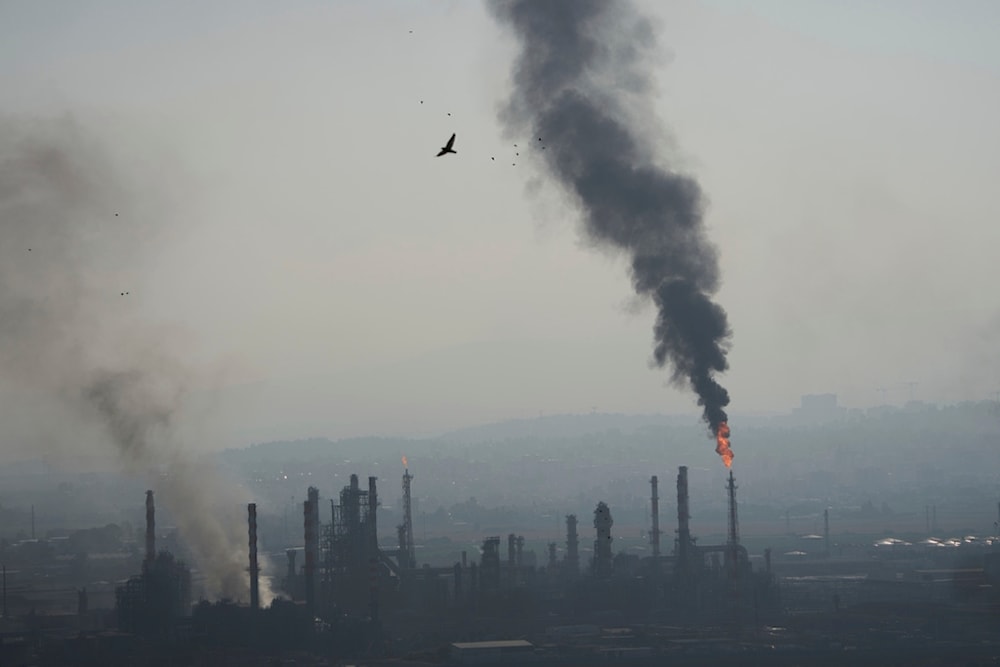Russia condemns Israeli attack, urges de-escalation
Moscow warns of severe risks near Iran’s Bushehr plant, condemns Israeli aggression, and calls for urgent return to diplomacy to avoid wider escalation.
-

Smoke billows after an Iranian missile struck an oil refinery in Haifa, northern occupied Palestine, early Monday, June 16, 2025. (AP)
Amid the Israeli illegal and unprovoked war against Iran, Russia has called for de-escalation and a return to diplomacy, voicing alarm over the potential consequences of continued military exchange after the Israeli occupation bombed Iran days earlier, completely unprovoked. Russian Deputy Foreign Minister Sergey Ryabkov stressed Moscow’s active engagement with both Tehran and Tel Aviv in an effort to prevent further deterioration.
Speaking to reporters on Monday, Ryabkov stated: “What is happening is very worrying. The Russian Foreign Ministry is not just closely monitoring the situation, but remains in contact with the parties involved. We have publicly called for restraint and unequivocally condemned Israel's unprovoked use of force, which violates the principles of the UN Charter.”
Ryabkov confirmed that Russia is also holding talks with US representatives about the war. "The topic of Iran comes up during our contacts with the US side," he said, noting that discussions have taken place on multilateral platforms in recent days.
'Severe consequences'
Moscow is particularly concerned about the threat posed to Iran’s Bushehr nuclear power plant amid the exchange of strikes. “This is extremely dangerous,” Ryabkov warned. “The fact that there have been no catastrophic consequences so far is a matter of coincidence. But the risks are too high.”
The Russian diplomat reiterated the importance of halting the spiral of escalation. “What is needed now is not further use of force, which brings severe consequences, but a return to common sense and negotiations,” Ryabkov said.
He emphasized that Iran is acting within its right to self-defense, while urging the Israeli regime to demonstrate restraint. “We believe there is no alternative to a political and diplomatic resolution,” he added, expressing regret that indirect contacts previously planned in Oman have now been canceled due to the situation.
Ryabkov also dismissed Israeli expectations that its strikes could damage Iran’s nuclear infrastructure as “groundless.”
Putin holds talks with Trump over Iran
Russian President Vladimir Putin and US President Donald Trump spoke by phone on Saturday, with discussions centered on the recent Israeli aggression against Iran and the continuing conflict in Ukraine, according to the Kremlin.
During the call, Putin condemned the Israeli strikes as a destabilizing and provocative act, particularly given their timing, just days before planned nuclear negotiations between Iran and the United States.
"Despite such a complicated situation, the Russian and American presidents didn't rule out a return to the negotiating track on the Iranian nuclear program," said Kremlin aide Yuri Ushakov, who described the call as "meaningful, frank, and most importantly, very useful."
Iran has held Washington directly responsible for the escalation, citing its open backing of Tel Aviv's attacks. The Israeli airstrikes, which killed senior Iranian military officials, Major General Hossein Salami and Chief of Staff Major General Mohammad Bagheri, alongside several nuclear scientists, and scores of civilians, were widely condemned across the region.

 4 Min Read
4 Min Read








